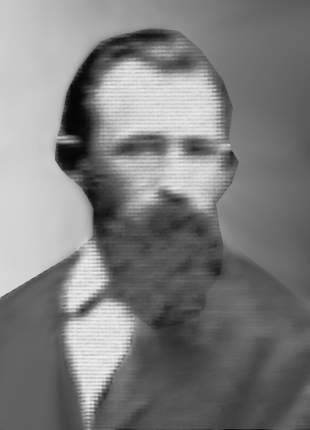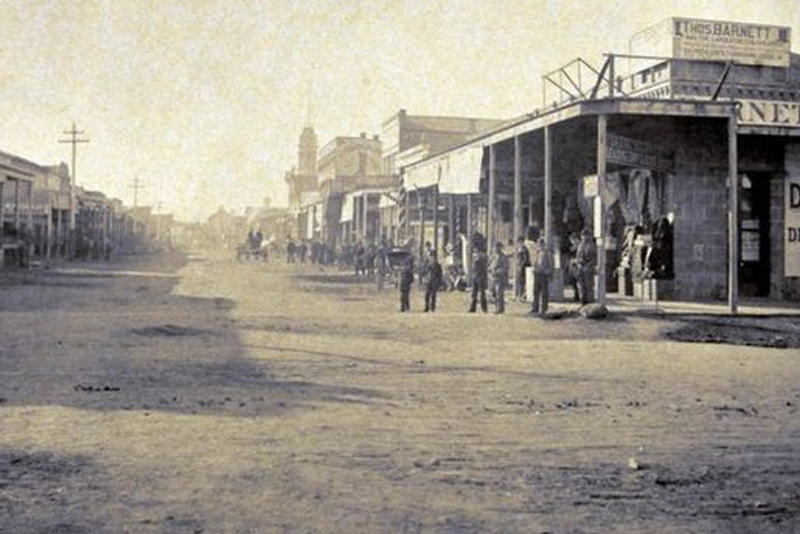
Harry P. Brown, Chief of Police
We’ll begin the biography of Chief Brown with the sad announcement of his death. On September 25 1905, the Gazette published “Death Claims Harry Brown”. He was 58 years of age Harry Brown was the first Reno Police Officer killed in the line of duty.
Based upon Harry Brown’s obituary, he and his wife Mary were married in Reno in 1876 when he was 29 years of age. There is evidence that they may have invested in a local market but little is known if it was successful.
The article of his obituary seemed full of slight inaccuracies. The article sub-headlines stated, “Well Know Police Officer Dies After Long Illness”. While it was true that Officer Brown was no doubt well known and had been weakened by some lingering aliment, the fact of the manner is he died as a result of a vicious physical assault while making an arrest August 11, 1905. Officer Brown had been brutally kicked in the side of the head by a prisoner about two months prior to his death and would become Reno’s first officer to die from “line of duty injuries”.
The article further stated, “Harry Brown was one of Reno's best and most respected citizens and had resided here nearly all his life, having come to Reno when but a young man. He was truly well respected and was honored with the likes of E.L. Drappo a city councilman and George W. Mapes Sr. acting as his pallbearers.
The obituary stated that he served for sixteen years as a police officer in this city and for twelve years was chief of police.” His total number of years as chief of Police and even as a police officer mentioned upon his death is questionable, but it is not uncommon to discover obituaries a little embellished.
Harry Brown was not only one of Reno’s first chiefs’ of police during a time when the management of the city of Reno was in flux, but his role as one of the early police leaders is often overlooked.
*** LINKS TO ADDITIONAL READING ***
Harry Brown, Chief of Police 1893 - 1903

Looking south down Virginia Street about 1882, just before Harry Brown was to become the Chief of Police. The Iron Bridge and the Riverside Hotel can be seen at the end of the street.
THE CONFUSING ERA OF CHIEF HARRY BROWN
by Jim Gibbs
Harry must have had a personality that called for him to take action when he witnesses somebody doing wrong. According to a story in the Gazette, he was delivering meat to a store when he observed a man selling whiskey to an Indian which was illegal in 1883. Harry reportedly arrested the man and took him to jail.
In 1884, Harry Brown was elected to the political office of Washoe County Public Administrator which also served as Coroner. For the next two terms, 4 years, he would administer the estates of people who died without wills and conduct a Coroner’s Inquest whenever a person died unattended by a doctor. He would be reelected in 1886, but would lose the election in 1888. Although no longer the “Public Administrator” Brown went into the private business of administrating the estates of individuals who had died with a will. Brown would be reelected as Public Administrator and Coroner in 1892.
His experience as the Washoe County Corner and his political involvement may be what gained him a spot on the newly created Reno Police Department when the town was incorporated for the second time in 1889. He was also paid $50.80 as a deputy constable by the Washoe County Commission in January 1889 working for Constable S. W. Upson. There is little evidence of him working for the Reno Police under Chief John Douglas until his appoint as chief in 1893, but the dates match with what is claimed in his obituary. Loosely speaking, his service as a deputy constable could be considered working as a police officer which his family says that Harry started in 1889
When John Douglas relinquished the position as Reno’s Chief of Police in 1893, Harry Brown was appointed Chief of Police by the Washoe County Commission on March 16, 1893.
In 1896 While still officially the Reno Chief of Police, Brown ran for constable. The race for constable was between three people. Brown with only 190 votes was beaten handedly by both his opponents when Thomas McGovern took 353 votes and W. D. McNeilly would win the spot of being the Reno Constable with 508.
Perhaps Brown was seeking the constable position as he was aware that his Chief of Police spot would go away in the very near future. Also, on that 1996 ballot was the question “Shall Reno be incorporated?” The vote was an overwhelming “Yes” with 642 votes with “No” acquiring 213.
1997 saw the incorporation of Reno and on the eve of the incorporation in December of 1896 it appears that Harry Brown abandon his position as Reno’s Chief of Police. Again, maybe Harry had insight how and when the new city would be created. Harry may have know that the Nevada State Legislator would not create a police department per se that would continue to employ him as chief of police.
It was interesting that the legislative reporters in Carson City from the Nevada State Journal didn't seem to believe that the incorporation of the City of Reno was going to happen. On March 2nd of 1897 The Nevada State Journal published, "Up to the present time no motion to reconsider has been given on to the Reno incorporation act. It is generally understood that if the motion is made it will not cut much of a figure.“ While the Nevada State Journal reporters thought the act would fail, Harry Brown appeared to believe otherwise and he was correct. On March 8, 1897 “An Act to Incorporated the Town of Reno” passed into law.
Why shouldn't Reno be incorporated as a city? It had been voted on and approved by the people of Reno overwhelmingly. It wouldn’t be surprising if Harry Brown had an issue with the new City of Reno knowing that the legislators would option to dispose of the chief of police position in the legislation to create a city and pay the elected constable a fee as the Reno City Marshal. Perhaps knowing that the constable would become the new city’s police officer may have also been his reasoning for running for the position of constable in November of 1896 while he was still, “Chief of Police”.
Harry Brown obviously didn’t agree with much that created the new city and its City Council and a legal system essential eliminating the position of police chief. He continued to express his disagreement with those who had been selected to make up that first City Council and in fact Harry Brown put his hat in the political ring again but this time for the 5th Ward seat on the City Council when their seats became elected positions in November 1898. Brown would lose the contest collecting an embarrassingly small number of votes. In his defense, the winner, R. S. Osburn was an incumbent who had been elected mayor by his fellow councilmen after all were named as council members in the legislation creating the City of Reno in 1897. The power structure that would take control of Reno in 1897 would be short lived. and legislated out of business in 1899 seemingly as quickly as they claimed office.
There may have been an additional reward for Harry Brown for his campaign efforts for City Council as shortly after the newly elected councilmen took office, Harry was appointed as Reno’s Superintendent of Streets and would remain in that position as the newly created City of Reno collapsed back into a township.
In the meanwhile, attempting to track Reno’s law enforcement between 1897 and 1899, paid announcements in the newspapers referred to Constable Ward McNeilly as Chief of Police while news stories referred to him as “City Marshal”. The fact of the matter, he was the elected Constable responsible for a political subdivision in Washoe County referred to as the Reno Township which is much larger than what lies within the city limits of Reno and the ex-officio City Marshal for the city of Reno. Constable McNeilly had the power to act as the chief of any police officers employed by the City of Reno. Typically, elected Constables hired deputies who usually served the constable’s office as a fee base officer. It seems very likely that any deputy constables serving McNeilly also served as a city police officer. In an interesting twist, Charles Leeper, who would become “Reno’s Chief of Police” when Reno incorporated again in 1903 was the deputy constable to McNeilly and would have like been considered a police officer for the short lived City of Reno between 1897-1899.
While the legal battles over the new City of Reno began as soon as it was created, by February of 1898, the Nevada Supreme Court ruled in favor of the legality of the Reno City Council. The City of Reno created by a legislative Act in 1897 was legal. Lawyers for the City stated that every objection had been resolved, and the question of the Reno Incorporation Act was settled. While that seem to be true, it was not. The fight would continue and the incorporation of the newly formed city would be lost.
The election of November 1898 seemed to show progress of the new city with the reelection of nearly every person named to the Reno City Council by legislative Act the year before. However, the election also seemed to change the political forces supporting the newly formed city and as the new year 1899 began to develop so did problems.
It is difficult to follow the new City of Reno as it progressed. All the department heads for the city were essentially elected county officials acting as ex-officio city employees. The city council headed by Mayor Osburn didn’t seem to feel accountable to the people. One citizen, who happened to be a retired judge, complained that the City Council had objected to having city bills audited and the retired judge stated that President Osburn, the mayor, had answered that was unnecessary and expensive to audit the city’s bills. The Incorporation Act of 1897 authorized the City Council to borrow $150,000 and the authority to created a “water works” for the City of Reno. That water works seemed to be both the intent of the new city and the unraveling of the city incorporation.
While the City Council seemed to be squabbling over a water system for the city, little or no attention seemed to be paid to law enforcement and the wild streets of Reno. Constable McNeilly, advertising as Chief of Police, threaten to enforce City Ordinance No. 19 with the usual penalties for disobedience of the ordinance. However, no city ordinances were ever published during the period of 1897-1899 with the exception of two. Both described wages for officials acting in behalf of the City.
Of the two ordinances published, one was created early in April of 1897. That ordinace was City Ordinance No. 49. which paid a salary of $20 per month to the County Clerk acting as ex-Officio City Clerk. It is interesting that the other was created nearly two years later as one of the final acts of the city council. In March of 1899, as the Nevada Legislators disincorporated the City of Reno, the City Council passed City Ordinance No. 3 fixing and regulating the salaries and compensation of the Police Judge and City Marshal. The Justice of the Peace for the Reno Township acting as ex-officio Police Judge was to receive $25 per month, and the Constable of the Reno Township acting as ex-officio City Marshal was to receive and salary of $50 per month. The announcement of Ordinance No. 3 would be published in the Reno Newspapers for weeks after the City of Reno was disincorporated and the City Council had been shown the door.
In March of 1899 as the City Council adopted Ordinance No. 3 which paid the Constable of Reno Township for his services as ex-officio City Marshal for the City of Reno, the attorneys for the “Water Works” used political pressure in Carson City to file legislation to disincorporate the City of Reno. The legislators acted quickly and simply. With not much more to say than "An Act entitled "An Act to incorporate the Town of Reno,” approved March 8 1897, is hereby repealed. All ordinances now in force in the City of Reno shall continue in force in the Town of Reno until changed as provided by law.
The County Commission would immediately take action to adjust the tax rates of the once again “Town of Reno”, but not much else was publicized. Harry Brown continued to be the superintendent of streets, and by early 1900 would once again be listed as Chief of Police in in the Reno newspapers.
There would be another effort to incorporate Reno as a city in 1901 but when taken to the vote of the people, the idea of incorporation would fail. The police department for the Town of Reno under the oversight of the County Commission would develop again under the leadership of Harry P. Brown until the Town of Reno would once again, and permanently become incorporated as the City of Reno in 1903.

SHARE THIS PAGE!